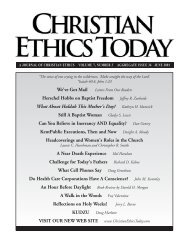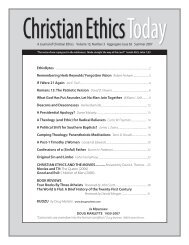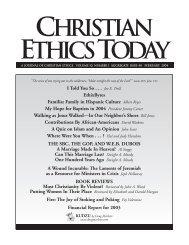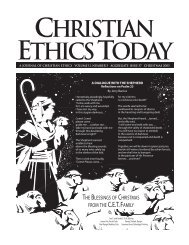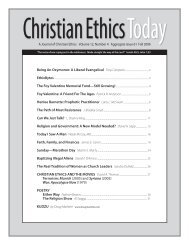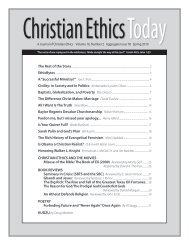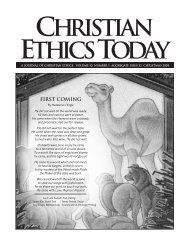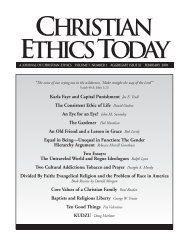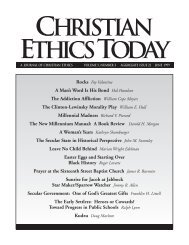Issue 033 PDF Version - Christian Ethics Today
Issue 033 PDF Version - Christian Ethics Today
Issue 033 PDF Version - Christian Ethics Today
Create successful ePaper yourself
Turn your PDF publications into a flip-book with our unique Google optimized e-Paper software.
experience rather than dispassionate research. This is the rare<br />
academic effort that one could easily see occupying a valuable<br />
place in the thinking of those who actually do hospitality most<br />
extensively.<br />
If the discipline of <strong>Christian</strong> ethics is to serve the church<br />
well in years to come, we must do more of this kind of work—<br />
retrieving aspects of the <strong>Christian</strong> moral tradition for contemporary<br />
application, writing both out of personal moral<br />
practice and richly researched scholarly effort. We must be<br />
both moral archaeologists and practitioners. Christine Pohl’s<br />
Making Room can be a model for such efforts in the years to<br />
come. ■<br />
The Twentieth Century:<br />
A Theological Overview<br />
Gregory Baum, ed., Orbis, 1999.<br />
The editor, Gregory Baum, attempts in this work to bring a<br />
team together that can reflect theologically on the monumental<br />
and oftentimes disastrous events of the twentieth century.<br />
It is a project that only succeeds in part.<br />
The work is divided into two parts. The first seeks to trace<br />
“the impact of historical events on theology.” The second part<br />
offers “theological evaluation of events and movements.”<br />
The first section covers World War I, modernity, the<br />
Bolshevik Revolution, the Depression, the Nazi era, the<br />
Holocaust, world capitalism, globalization, and the emergence<br />
of a world church. The second deals with secularization, the<br />
ecumenical movement, Vatican II, Marxism, feminism, liberation<br />
theologies, the ecological crisis, and postmodernism.<br />
Contributors include mainline stalwarts Rosemary Ruether,<br />
Harvey Cox, Douglas John Hall, Virgilio Elizondo, Gary<br />
Dorrien, and a host of lesser-known figures.<br />
I was interested in this book not only because of its coverage<br />
of historical events and trends of signal importance, but<br />
also because of my growing conviction that evangelical theology<br />
and ethics generally do not adequately take historical events<br />
into account. While mainline and radical theology/ethics tends<br />
to be deeply and self-consciously contextual, evangelical versions<br />
often seem to be the last bastion of an ahistorical<br />
approach that attempts to jump from Scripture to application<br />
without remainder. Or, alternatively, certain strands of evangelical<br />
thought are tied so closely to particular theological figures<br />
and traditions (e.g., Calvin, Luther) they sometimes seem to<br />
learn nothing from the historical events that have occurred<br />
since the esteemed Doctors made their appearance on history’s<br />
stage.<br />
The book succeeds only in part because of the uneven quality<br />
of the contributions, always the bane of edited collections.<br />
The discussions of the Catholic response to modernity, the<br />
Communist Revolution in Russia, the ecumenical movement,<br />
and liberation theologies, in particular, were weak enough as to<br />
damage the overall impact of the book considerably.<br />
On the whole, however, The Twentieth Century helps to<br />
open a conversation that needs to continue: what should we<br />
22 • APRIL 2001 • CHRISTIAN ETHICS TODAY<br />
make of the bloody century just past? How do we speak of<br />
God and the church in the context in which we actually find<br />
ourselves? These are questions well worth asking, and Baum is<br />
to be thanked for his contribution to the quest for answers. ■<br />
Goebbels<br />
Ralph Georg Reuth (translated by Drishna Winstoon),<br />
Harcourt Brace, 1993.<br />
This is an engrossing biography of one of Adolf Hitler’s<br />
closest henchmen. As such, it is predictably enraging and<br />
depressing. For in Joseph Goebbels, as Ralf Georg Reuth<br />
depicts him, we have in many ways a prototypical Nazi functionary,<br />
the kind of man Hitler needed by his side to help<br />
destroy the soul of a nation and consume millions of lives.<br />
The Goebbels we meet in these pages is a small-souled<br />
man, driven by bitterness over childhood slights, relentless and<br />
self-centered ambition, an imperial sense of his own importance,<br />
a paganized faith in the Nazi cause, and an almost childlike<br />
(or romantic?) loyalty to Hitler himself. He is not without<br />
energy, talent, or organizational ability, and it is hard to imagine<br />
the triumph of Nazism apart from his sometimes ingenious<br />
propaganda skills.<br />
In the end, as Reuth shows us, Goebbels is perhaps most<br />
remembered for the cult-like decision of himself and his<br />
equally fanatical wife to kill themselves and their own children<br />
rather than to live in a world without Hitler and Nazism. “The<br />
world that will come after the Fuhrer and national socialism<br />
won’t be worth living in,” he wrote, and he was as good as his<br />
word.<br />
Reuth’s biography is a bit short on analysis. Little effort is<br />
made to offer an eloquent summing up, evaluation, or reflection<br />
on the life being considered here. This is more of a documentation<br />
than a reflection on a life, but the documentation<br />
reveals a frightening soul whose appearance on the historical<br />
scene did no one any favors. ■



